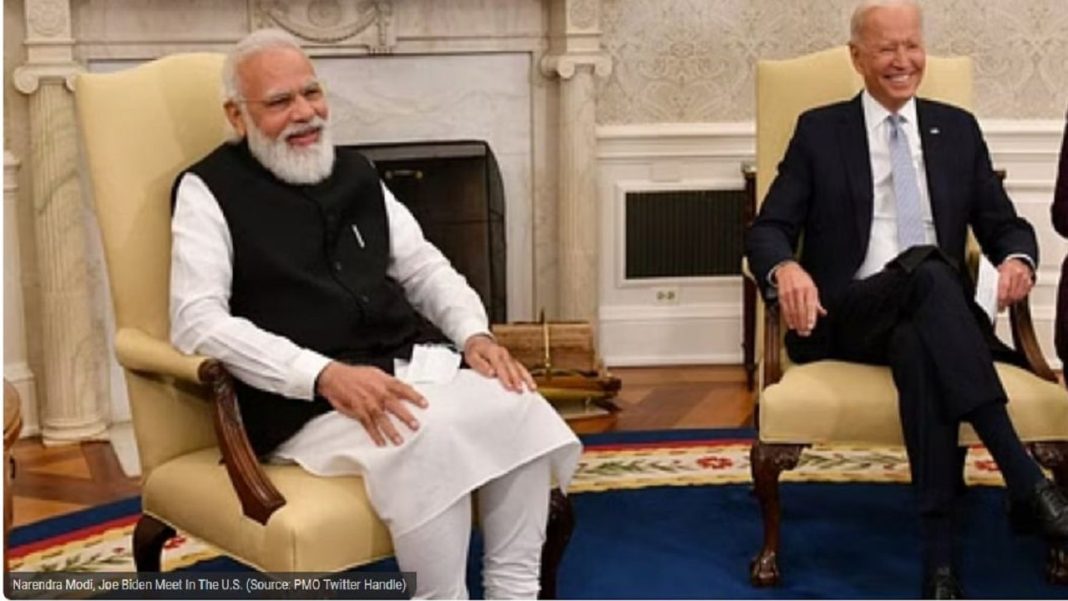The cover of the latest Economist captures the moment—it shows Biden wearing a gold chain and casuals and stroking a tiger. “America’s new Best Friend” says the headline while the caption reads: “Why India is indispensable?”
Ignore the razzmatazz that usually accompanies a Modi state visit, this is all to do entirely with China. America has pulled out all the stops to make it a successful visit with some lucrative defence deals added to the visit. Many American businessmen see India as one of the few economies that will boom. The Biden administration is making a substantial and glitzy diplomatic effort to impress Indian Prime Minister Narendra Modi about the importance of India in US relations in Asia despite any misgiving about India’s treatment of religious minorities in Modi’s Hindu nationalist approach.
At the official dinner, logically, the five Indian American Congresspersons—Ami Bera, Raja Krishnamoorthi, Pramila Jayapal, Ro Khanna, and Shri Thanedar—will be there, along with several eminent Indian Americans serving in the Biden administration: Neera Tanden, Dr Vivek Murthy, and Dr Rahul Gupta.
It would not be a surprise if Microsoft’s Satya Nadella, Alphabet’s Sundar Pichai and the top bosses of IBM, Adobe, Palo Alto Networks, VMWare and Vimeo, all of whom are of Indian descent, are invited.
It might be a surprise if Mindy Kaling, the actor, and Salman Rushdie, the author, are there. However, perhaps Parag Agrawal, the ousted CEO of Twitter is unlikely to be on the list, given the relations between Twitter and the right-wing audience in America.
Indian-born Silicon Valley CEOs are part of a four million-strong minority group that is among the wealthiest and most educated in the US. About a million are scientists and engineers. More than 70% of H-1B visas—work permits for foreigners—go to Indian software engineers.
In the wake of the civil rights movement, national-origin quotas were replaced by those that gave preference to skills and family unification.
Indian immigrants were unlike most immigrants, as often they were upper-caste privileged Indians who could afford to go to a reputed college and afford a masters degree in science, technology, engineering and maths. STEM, as the preferred category is labelled in the US.
This is the cream of the crop, and they are joining companies where the best rise to the top. According to technology entrepreneur and academic Vivek Wadhwa: “The networks they have built [in Silicon Valley] have also given them an advantage—the idea was that they would help each other.”
Indian diplomacy has been getting more assertive about saying that this is the country’s moment on the global stage. It has good reason—India is one of the few economic bright spots in the world right now. Geopolitics is also in its favour—most countries want a manufacturing alternative to China, and India also has a huge market with a burgeoning middle class. This makes it a good option for countries and global firms pursuing a China-plus-one policy. India has not shied away from taking decisions that irk China. It held a military drill with US forces last year in Uttarakhand state, which shares a Himalayan border with China. Delhi has also continued to actively participate in the Quad—which also includes US, Australia and Japan—despite angry reactions from Beijing.
Can India replace China as the world’s factory? Tanvi Madan, Director, The India Project, at the Brookings Institution in Washington DC, says that what matters to the US is what India does and not what it publicly says about China. “At the end of the day, whether or not India has publicly embraced the tag, it is very clear that Indian governments have seen the US relationship as helpful as they deal with China,” she said.
The two countries have signed what they call the Initiative on Critical and Emerging Technology. The deal will allow US and Indian firms and universities in different sectors, including IT, space, defence, artificial intelligence, education and healthcare, to work together. The leaders may also announce more cooperation in technology, especially in semi-conductor manufacturing where China is the biggest player. Defence is another area that has emerged as a key point of convergence.
India is the world’s biggest arms importer and Russia still accounts for a major chunk of it at 45%, data analysed between 2017 and 2022 suggests. But, the headline here is that Moscow’s share used to be 65% until 2016—that’s where the US sees an opportunity.
The timing of the visit is also interesting as both the countries will hold elections next year and the two leaders will be looking at sellable headlines for their domestic audiences.
So, some big headline-making deals are inevitable. But then, US-India relations have always been complex—with decades of mistrust followed by rebuilding of trust and then occasional flare-ups. However, President Biden seems determined to make India-US relations shine even though some in his country have questioned India’s record on human rights under Modi.
On the eve of the visit, 75 Democratic members of Congress urged President Biden to raise human rights issues. They said they were concerned about rising religious intolerance and press restrictions, the shrinking of political space and the targeting of civil society groups in India. Human rights groups plan protests during Modi’s trip.
US Secretary of State Antony Blinken’s recent statement speaks volumes about the current status of the India-US relationship. He said: “We know that India and the United States are big, complicated countries. We certainly have work to do to advance transparency, to promote market access, to strengthen our democracies, to unleash the full potential of our people. But the trajectory is definitely upward.”
—The writer has worked in senior positions at The Washington Post, NBC, ABC and CNN and also consults for several Indian channels


